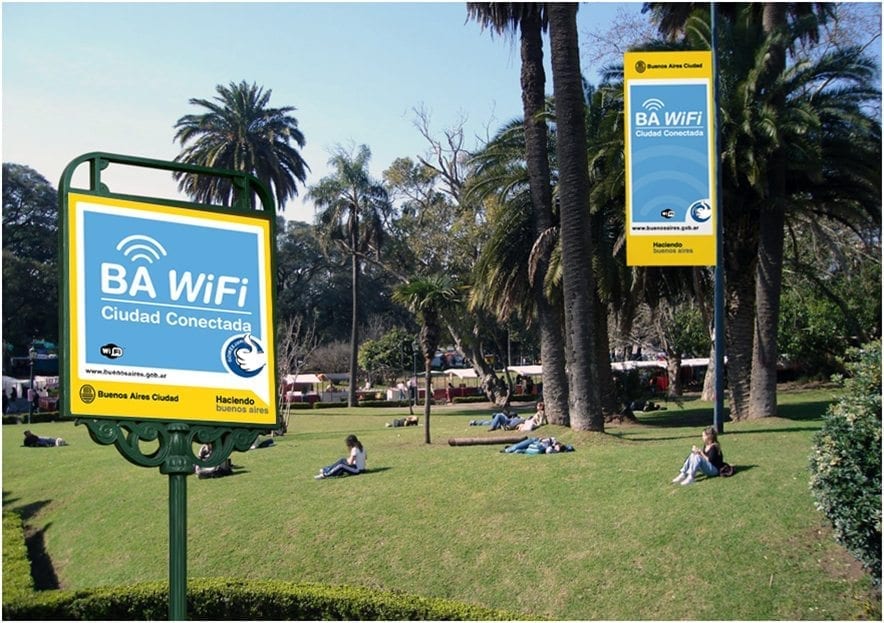Massive internet arrived in 1992. That was the time of the old phone modem, Wi-Fi didn’t really exist yet and it was very limited and very expensive. Since then the internet has evolved all around the world and has become what it is now. As for Argentina, it has grown impressively and unstoppably during all those years.
Today Buenos Aires has to be one of the most connected cities in Latin America and the world, and it is also on its way to become the city with one of highest number of internet users. Argentine use social networks more than anybody else, according to recent statistics. It is because of all these demands, the Internet companies are vigorously competing to attract even more customers by lowering their prices and increasing the broadband. There are so many options now to get connected that everyone can find a plan that suits their needs. Cable is the most popular type of connection, nevertheless DSL and 4G are also a big part of the internet market.
A lot of our students that come to learn Spanish in Buenos Aires ask about how to get connected. They worry about having to pay for cellular roaming or internet roaming. The good news is that in 2009 the Argentine Federal Government declared that having Internet is a human right. That also means that for those who can’t afford internet and/or means of accessing it, they can get it for free. Since 2009, the Government has given out free notebooks to elementary and high school students and teachers. More than 2 million computers have been given out so far.
Although Internet access is a Federal policy, many provinces have their own local plans. The province of San Luis, for example, has free Wi-Fi not just at some spots but in the whole province! They have installed Wi-Fi routers in every corner of the province. That means if you are passing through there on a long distance bus, you can easily talk to your family using Skype while on board.
The city of Buenos Aires also has many projects. Some are already in effect and some are in progress. While the city is still on its way to be connected everywhere, you can actually get free Wifi at many public places already:
– On all the Subterranean lines A/B/C/D/E/H
– Some middle and long distance buses like bus 57 that goes to the suburb Pilar
– Most bars and restaurants (you can just have a small coffee, sit there for the whole afternoon and no one will bother you)
– Most of the big shopping malls
– Educational Institutions like us at Vamos Spanish
– 26 public plazas including but not only Plaza Houssay in Recoleta (Córdoba y Uriburu), Plaza Borrego in San Telmo (Humberto 1° y Defensa), Plaza Cortázar in Palermo Soho (Honduras y Serrano), Plaza Libertad (Paraguay y Libertad), Plaza Rodríguez Peña (Callao y Paraguay) etc.
Now you know where you can get free Wi-Fi in Buenos Aires, but what if you are moving to the city renting your own place and need to order your own Internet services? The top 3 most popular Internet companies are Fibertel (cable), Arnet (ADSL) and Speedy (ADSL). And here are some general info of their prices, contracts and details (as of April 2012):
1. Fibertel is by far the best option, since they don’t have any contract or minimum requirement. Foreign citizens can, without any complicated process, call and ask for the services by providing your name, passport number, and address in Argentina. They are also the one with the best broadband speed and prices.
You don’t even need a phone line because they use Cable technology and since they have upgraded their system with DOCSIS 3.0, they can provide the fastest speed on the market.
Plans:
– 3 Mbits download and 512 Mbits upload (unlimited data). Price AR$110 per month (~ US$25/mth)
– 6 Mbits download and 768 Mbits upload (unlimited data) Price AR$130 per month (~ US$29.50/mth)
– 30 Mbits download and 3 Mbits upload (unlimited data) Price AR$300 per month (~ US$68/mth)
2. Arnet uses ADSL, you will need to have a phone line to set up this service. They have a minimum contract of 1 year, but it can be canceled with a penalty fee. They have many complicated plans and their upload is not very good. Plans start from AR$90 per month.
3. Speedy uses ADSL, so you will also need a phone line to get this set up. Like Arnet, they require a minimum contract of 1 year, and charge a fee for early cancellation. Plans start from AR$120 per month,
At Vamos Spanish Academy, we know how important it is for our students to be connected and no doubt our free Wi-Fi service is always on high demand; therefore, we chose to subscribe the best service we could get in town, which is the 30 Mbits connection with Fibertel. It’s definitely more than enough for all the students to get connected at the same time and everyone can surf happy!
Ale




